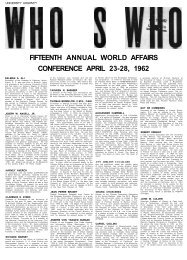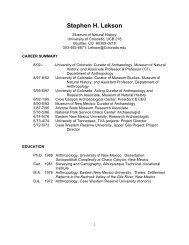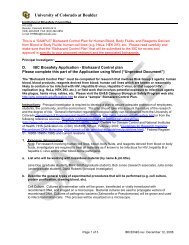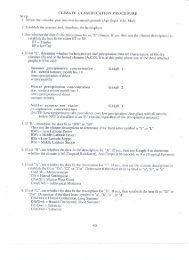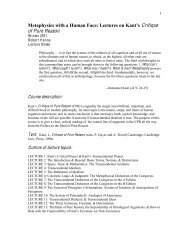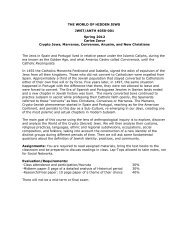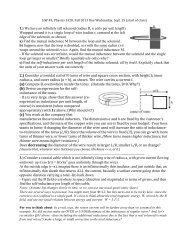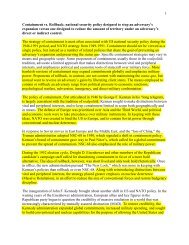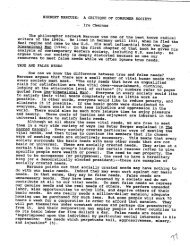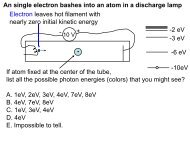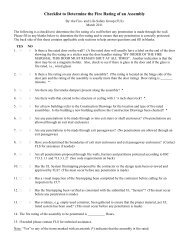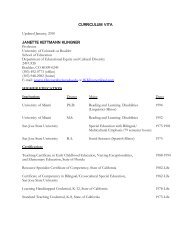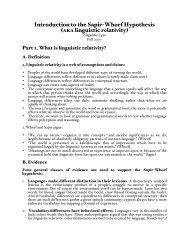principles of ecology, ebio 2040 - University of Colorado Boulder
principles of ecology, ebio 2040 - University of Colorado Boulder
principles of ecology, ebio 2040 - University of Colorado Boulder
You also want an ePaper? Increase the reach of your titles
YUMPU automatically turns print PDFs into web optimized ePapers that Google loves.
PRINCIPLES OF ECOLOGY, EBIO <strong>2040</strong><br />
Laboratory Syllabus Fall 2013<br />
Lab coordinators<br />
Dr. Mary Starhil<br />
Dr. Monica Madronich<br />
mary.starhill@colorado.edu<br />
monica.madronich@colorado.edu<br />
Graduate Teaching Assistants (GTA)<br />
Jeff McClenahan<br />
Aden Beers<br />
Gaddy Bergemann<br />
Megan Caldwell<br />
Eve Garsach<br />
Nathan Kleist<br />
Melanie Kenney<br />
Kika Tarsi<br />
jlmcclenahan@gmail.com<br />
Aidan.Beers@<strong>Colorado</strong>.edu<br />
Gaddy.Bergmann@<strong>Colorado</strong>.edu<br />
Megan.Caldwell@<strong>Colorado</strong>.edu<br />
Eve.Gasarch@<strong>Colorado</strong>.edu<br />
Nathan.kleist@gmail.com<br />
Melanie.Kenney@colorado.edu<br />
Jessica.Tarsi@<strong>Colorado</strong>.edu<br />
“Principles <strong>of</strong> Ecology” (EBIO <strong>2040</strong>) is a required course for Ecology and Evolutionary Biology<br />
majors and is also taken by many Environmental Studies majors. This course provides you with<br />
an overview <strong>of</strong> Ecology, covering topics ranging from global abiotic processes and biomes, to<br />
community and population level dynamics. The lab portion <strong>of</strong> this course emphasizes techniques<br />
<strong>of</strong> field biology. It complements the lectures by helping you to understand how to generate and<br />
test ecological hypotheses by examining issues such as how to quantify and estimate diversity,<br />
how to measure landscape level patterns and how to utilize computer programs to help analyze<br />
ecological data. You will also develop, conduct and present an independent project that will<br />
allow you to implement the skills you have learned throughout the course.<br />
The EBIO <strong>2040</strong> lab curriculum was recently updated, and this fall will be the first time many <strong>of</strong><br />
the new lab exercises are run. The goals <strong>of</strong> the new lab curriculum is to expose you to:<br />
• Concrete examples <strong>of</strong> general ecological concepts from the lectures<br />
• The basic <strong>ecology</strong> and conservation issues <strong>of</strong> the ecosystems <strong>of</strong> the local bioregion<br />
(<strong>Boulder</strong> County)<br />
• The types <strong>of</strong> activities pr<strong>of</strong>essional ecologists do in their work<br />
• All the stages <strong>of</strong> scientific process that ecologists use to investigate ecological systems,<br />
including:<br />
careful observation <strong>of</strong> field systems<br />
quantitative measurement <strong>of</strong> patterns in ecological systems<br />
hypothesis formation
experimental design<br />
quantitative analysis <strong>of</strong> ecological data, and<br />
writing and presenting scientific research.<br />
We are aiming to make these labs both highly informative and fun – it is the love <strong>of</strong> nature and<br />
the outdoors that draws most ecologists to the discipline. After you have completed the lab<br />
exercises <strong>of</strong> this course, you will have all the basic tools necessary to contribute to original<br />
ecological work. We highly encourage those <strong>of</strong> you interesting in graduate school or a career as<br />
a pr<strong>of</strong>essional ecologist or resource manager to take these tools and apply them in future<br />
semesters to either an independent study project overseen by a pr<strong>of</strong>essor here on campus, or<br />
to an internship overseen by biologists at one <strong>of</strong> the local resource agencies. Performing this<br />
type <strong>of</strong> original work as undergraduate will help distinguish you as a recent college graduate,<br />
and can play a big role in launching your career.<br />
Books and Printed Materials<br />
Required<br />
• Peterson field guide to Birds <strong>of</strong> Western North America (you may also want to get an<br />
electronic version <strong>of</strong> this for your cell phone)<br />
• Peterson field guide to Western Trees<br />
• A high quality bound field notebook (moleskin, bench lab notebook, or other <strong>of</strong> your<br />
choice)<br />
• How to do Ecology. By Richard Karba. This book will help you with your Research<br />
Project.<br />
• We will also refer frequently to the lecture text (Ecology Second Edition, Cain Bower and<br />
Hacker, 2011)<br />
Highly recommended<br />
• Peterson field guide to Rocky Mountain and Southwest Forests (The only reason this is<br />
not required is that it is going out <strong>of</strong> print, but you can still get copies <strong>of</strong> this great book<br />
online.)<br />
Optional<br />
(These are great books to get for those <strong>of</strong> you with a strong interest in mammals and/or field<br />
biology)<br />
• Peterson field guide to Mammals <strong>of</strong> North America<br />
• Peterson field guide to Animal Tracks<br />
The lab assignments will be posted in electronic form on D2L in advance <strong>of</strong> when they will be<br />
executed. It is your responsibility to print out a hard copy <strong>of</strong> the assignment to read beforehand<br />
and bring to the lab exercise. Please do not rely on referring to just an electronic version.
Grading Policy and Lab Expectations<br />
The lab grade will be based on 200 pts and will constitute 1/3 <strong>of</strong> the overall class grade. The<br />
point distribution is as follows:<br />
Assignment<br />
Points<br />
Lab Reports 85<br />
Research Project 70<br />
Field Notebook 10<br />
Exam 30<br />
Participation 5<br />
Total points 200<br />
Table 1.1 Total number <strong>of</strong> points possible in this lab. A more detailed point breakdown <strong>of</strong> the<br />
assignments is located in the schedule document<br />
Lab reports<br />
You will turn in hard copies <strong>of</strong> your lab reports to your GTA at the designated time, which will<br />
generally be either at the end <strong>of</strong> your lab period, or at the beginning <strong>of</strong> the next lab period. You<br />
will find the due dates <strong>of</strong> the different assignments on the lab schedule.<br />
Research Project<br />
In this lab you will develop an independent scientific project. Your GTA will help you to develop<br />
a project in which you will investigate a topic <strong>of</strong> your interest. The results <strong>of</strong> your research will<br />
provide you with the data to write a paper. At the end <strong>of</strong> the semester you will present your<br />
results to your classsmates.<br />
Field notebook<br />
The art <strong>of</strong> taking good field notes is an important skill for ecologists. To develop this skill you will<br />
be taking notes in a designated field notebook. At the end <strong>of</strong> the semester you GTA will grade<br />
your notebook.<br />
Exams<br />
In this lab we are going to have 2 exams worth 15 points each. The exam will cover material<br />
learned over the course <strong>of</strong> the semester.<br />
Participation<br />
We strongly encourage participation and we hope that students use this course as an<br />
opportunity to explore concepts, methods and ways to present materials to your peers and<br />
future colleagues. It is better to be fully engaged in a class, even if that means ocassionally
putting out a wrong answer, because it helps clear up complex ideas for everyone and lets the<br />
GTA know how students are learning the materials.<br />
How to prepare for lab<br />
Lab time is limited, and especially on field days there will be much to do in this limited time<br />
period. For this reason you must come to lab periods on time and fully prepared. Your GTA will<br />
not wait for you to begin the lab, which means that on field trip days they may leave without<br />
you if you are late, and that would constitute an unexcused absence on your part. The reason<br />
we have this policy is to ensure that the educational experience <strong>of</strong> all the other students in the<br />
class is not hampered by one person’s tardiness, but it is good training for your possible futures<br />
as pr<strong>of</strong>essional ecologists. Being late for fieldwork is heavily frowned upon by biologists, and<br />
will quickly get you labeled as unpr<strong>of</strong>essional and an undesirable person to work with. Every<br />
pr<strong>of</strong>ession has its “honor code” about how to behave toward colleagues, and being prompt and<br />
willing to work hard in the field without whining is part <strong>of</strong> the field biologist honor code.<br />
The following are the things you need to do to prepare for all labs:<br />
• Print out the lab exercise<br />
• Read the lab exercise and any readings assigned before you come to lab<br />
Bring the following on all field labs:<br />
• Hard copy <strong>of</strong> lab exercise<br />
• Field notebook and writing implement<br />
• Field guides as relevant<br />
• Sunscreen and sun hat<br />
• Closed-toe footwear appropriate for hiking<br />
• An extra layer <strong>of</strong> clothing<br />
• Water and snacks<br />
• Cell phone with camera or digital camera (if you don’t have them, you can share with<br />
another students)<br />
Bring the following to all computer lab exercises:<br />
• Hard copy <strong>of</strong> lab exercise<br />
• Field notebook and writing implement<br />
• Text book<br />
• Field guides relevant to that day’s topic<br />
Attendance at labs is mandatory<br />
Absences due to health issues, deaths, <strong>of</strong>ficial university activities or major events beyond<br />
your control (e.g., a court appearance, car accidents, etc.) may be excused by your GTA, with<br />
appropriate documentation that will remain on file with the lab coordinator. Documentation to<br />
request an excusal must be submitted the week following an unplanned absence. Requests for<br />
excusing planned absences must be requested in writing at least 1 week prior to the scheduled<br />
absence. If possible, missed labs should be made up that same day in an alternate lab section. If<br />
a field trip is due on the day <strong>of</strong> the absence you will be responsible <strong>of</strong> your own transportation,<br />
there is limited room in the Vans. It is the responsibility <strong>of</strong> the student to contact both their GTA
and the GTA instructing the lab section they would like join. Students are allowed to 2 excused<br />
absences per semester. Following 2 make-ups, missed labs count toward a student’s absence<br />
tally. In the case <strong>of</strong> an excused absence, points for the missed exam or lab write-up will be<br />
prorated. An unexcused absence will result in a score <strong>of</strong> zero on the exam or lab write-up.<br />
Missing more than 2 labs (either excused or unexcused) will result in an additional point<br />
deduction <strong>of</strong> 5 points per missed lab.<br />
Working together<br />
In this lab, we will have a strong emphasis on students working in groups and we will also have<br />
a strong emphasis on groups presenting their results and ideas to the lab. Although students will<br />
be encouraged to work with others, it is expected that all assignments that are turned in are<br />
original works written independently by each student, separate from their lab partner(s).<br />
All students are expected to abide by the academic standards outlined in the <strong>University</strong> <strong>of</strong><br />
<strong>Colorado</strong> Honor Code. If you are unfamiliar with the Honor Code, read it at<br />
http://www.colorado.edu/policies/student-honor-code-policy . Violations <strong>of</strong> this policy may<br />
include: cheating, plagiarism, academic dishonesty, fabrication, lying, bribery, and threatening<br />
behavior. All incidents <strong>of</strong> academic misconduct shall be reported to the Honor Code Council<br />
(honor@colorado.edu; 303-735-2273). Students who are found to be in violation <strong>of</strong> the<br />
academic integrity policy will be subject to both academic sanctions from the faculty member<br />
and non-academic sanctions (including but not limited to university probation, suspension, or<br />
expulsion). Discussing exam material after you have taken the test is cheating!! Your GTA’s have<br />
been instructed to not give out any answers regarding any exam until the following lab period.<br />
All written work is subject to plagiarism prevention scanning s<strong>of</strong>tware. It is your responsibility to<br />
understand paraphrasing and quoting <strong>of</strong> references, as well as appropriate citation <strong>of</strong> your<br />
sources. Although you will present your final project presentation together with your lab<br />
partner(s), you will each write your own scientific paper completely independently <strong>of</strong> one<br />
another.<br />
We expect the labs to be open to varying opinions and ideas and that all students will respect<br />
their peers. Derogatory language, putting down others, and sexual harassment<br />
https://www.cu.edu/policies/aps/hr/5014.html ) will not be tolerated in this lab. Please read<br />
and understand the Campus classroom behavior policy and the honor code:<br />
http://www.colorado.edu/policies/student-classroom-and-course-related-behavior. As<br />
members <strong>of</strong> the CU-<strong>Boulder</strong> community, we will abide by the spirit and letter <strong>of</strong> this policy,<br />
which is available on line (https://www.cu.edu/policies/aps/hr/5014.pdf).<br />
Administrative Reminders<br />
1. If you qualify for accommodations because <strong>of</strong> a disability, please submit to your GTA a<br />
letter from Disability Services in a timely manner so that your needs may be addressed.<br />
Disability Services determines accommodations based on documented disabilities. (303<br />
492 8671, Willard 322, http://disabilityservices.colorado.edu/accommodation-and-orservices<br />
2. Teaching faculty shall make every effort to reasonably and fairly deal with all students<br />
who, because <strong>of</strong> religious obligations, have conflicts with scheduled exams, assignments<br />
or required attendance. We encourage you to notify your GTA <strong>of</strong> anticipated conflicts as
early in the semester as possible so that there is adequate time to make necessary<br />
arrangements. http://www.colorado.edu/policies/observance-religious-holidays-andabsences-classes-andor-exams.



